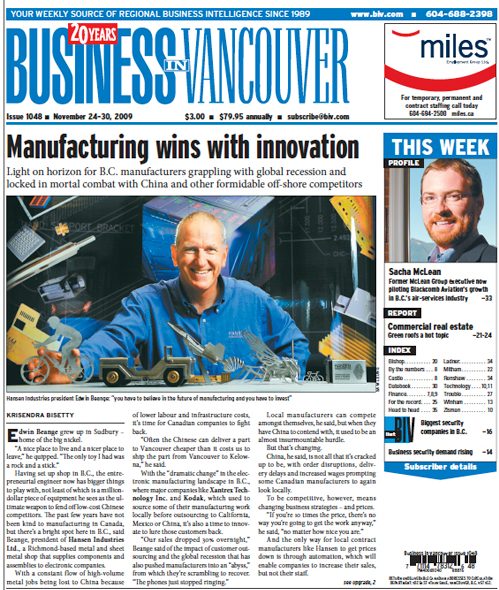Manufacturing wins with innovation
Light on horizon for B.C. manufacturers grappling with global recession and locked in mortal combat with China and other formidable off-shore competitors Krisendra Bisetty
Edwin Beange grew up in Sudbury – home of the big nickel. “A nice place to live and a nicer place to leave,” he quipped. “The only toy I had was a rock and a stick.”
Having set up shop in B.C., the entrepreneurial engineer now has bigger things to play with, not least of which is a million-dollar piece of equipment he sees as the ultimate weapon to fend off low-cost Chinese competitors. The past few years have not been kind to manufacturing in Canada, but there’s a bright spot here in B.C., said Beange, president of Hansen Industries Ltd., a Richmond-based metal and sheet metal shop that supplies components and assemblies to electronic companies.
With a constant flow of high-volume metal jobs being lost to China because of lower labour and infrastructure costs, it’s time for Canadian companies to fight back.
“Often the Chinese can deliver a part to Vancouver cheaper than it costs us to ship the part from Vancouver to Kelowna,” he said.
With the “dramatic change” in the electronic manufacturing landscape in B.C., where major companies like Xantrex Technology Inc. and Kodak, which used to source some of their manufacturing work locally before outsourcing to California, Mexico or China, it’s also a time to innovate to lure those customers back.
“Our sales dropped 30% overnight,” Beange said of the impact of customer outsourcing and the global recession that has also pushed manufacturers into an “abyss,” from which they’re scrambling to recover.
“The phones just stopped ringing.”
Local manufacturers can compete amongst themselves, he said, but when they have China to contend with, it used to be an almost insurmountable hurdle. But that’s changing. China, he said, is not all that it’s cracked up to be, with order disruptions, delivery delays and increased wages prompting some Canadian manufacturers to again look locally.
To be competitive, however, means changing business strategies – and prices.
“If you’re 10 times the price, there’s no way you’re going to get the work anyway,” he said, “no matter how nice you are.”
And the only way for local contract manufacturers like Hansen to get prices down is through automation, which will enable companies to increase their sales, but not their staff.
For 55-employee Hansen, that meant spending close to $2 million to upgrade its plant in Richmond and installing a state-of-the-art laser processing system that’s the only one of its kind on North America’s west coast. It took five flatbed trucks, including a wide-load trailer, to get the Mitsubishi machine in from Chicago.
One subsystem is a 16-shelf tower that holds 96,000 pounds of material; another cuts the material using a 4,000-watt CO2 laser that can pierce one-inch-thick steel in less than a second. Hansen cuts products for companies like 3M Canada, Kodak, Philips Electronics and Schneider Electric. Some of its parts are also found in cellphone towers, wall beds and fireplaces.
Combined with robotic welding and an in-line finisher, Beange said the system allows Hansen to compete head to head with China. He added that the system, which is designed to run 24 hours a day, seven days a week – largely unattended – allows him to quote on jobs he previously had to turn down.
“We can now unload a trailer full of material, load it into the tower, cut the parts and unload the finished parts onto a truck without a human touching the metal.”
He said the strong loonie and the global recession make it a “great time” for manufacturers to add equipment. Just 18 months ago, machine manufacturers had six-month order backlogs.
“The guys aren’t selling much equipment now, so when you say, ‘Hey I’m thinking of buying equipment,’ the next day you’ve got four guys from Chicago sitting in your office with something to sell.”
Beange, who runs Hansen from a one-page business plan based on Verne Harnish’s Mastering the Rockefeller Habits, said the recession has hammered revenue, which is down 30% from a year ago to approximately $7.5 million, but things are starting to look up.
“You have to believe in the future in manufacturing and you have to invest,” he said. “You’re either growing or you’re dying. There’s no middle ground.”
Dan Reader, a director of the B.C. division of the Canadian Manufacturers & Exporters Association, said manufacturers in the province are finding times tough.
“If we really work smart, there’s good hope for B.C. manufacturing,” said Reader, who is president of Murray Latta Progressive Machine Ltd., a Surrey company that makes industrial machinery for various sectors.
Check out the original article here!
This article from Business in Vancouver November 24-30, 2009; issue 1048 Business in Vancouver (www.biv.com) has been publishing in-depth local business news, analysis and commentary since 1989. The newspaper also produces a weekly ranked list of the biggest companies and players in a wide range of B.C. industries and commercial sectors, monthly features and industry-focused sections that arm its subscribers with a complete package of local business intelligence each week.


